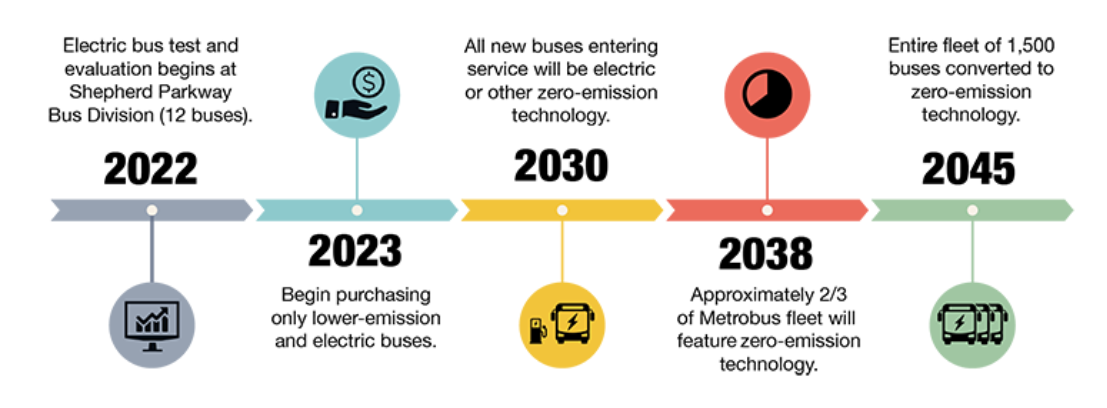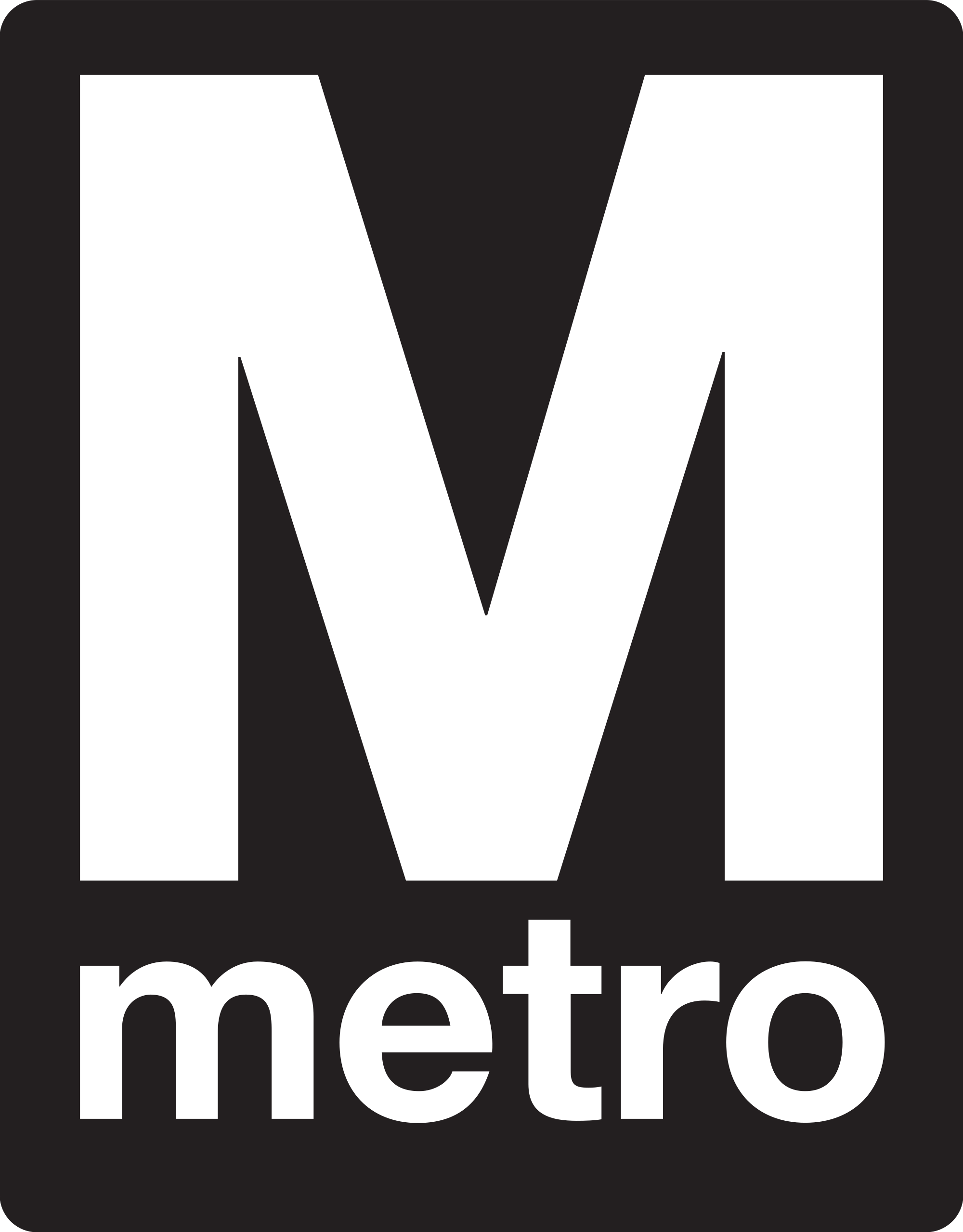Talk to us
Have questions? Reach out to us directly.
Zero-Emission Buses
View allMetro is transitioning to a 100% zero-emission bus fleet by 2045. This will improve regional air quality, reduce greenhouse gas emissions and provide customers with a quieter, comfier ride. Transitioning to zero-emission technology requires more than just new buses; Metro will also invest in facility and infrastructure upgrades over the coming years to support the introduction of new buses.
**Phased Conversion to 100% Zero-Emission Fleet
**Metro’s Board of Directors has adopted zero-emission bus goals that include phased conversion to a 100% zero-emission bus fleet by 2045. Since zero-emission buses are a newer technology than conventional diesel or natural gas (CNG) fueled buses, a phased approach will provide time for electric and other zero-emission technology (such as hydrogen fuel cells) to improve and provide consistent reliability on par with conventional buses, enabling Metro to continue providing the level of service required to meet our region’s mobility needs.
Beginning with Metro’s next bus procurement in 2023, only lower-emission and electric buses will be purchased, and existing diesel and diesel-electric hybrid buses will be phased out over time. By the end of 2030, all new buses entering service will be either electric or another type of zero-emission technology. This will result in approximately two-thirds of all buses featuring zero-emission technology by 2038 and the entire fleet of 1,500 buses converted to zero-emission technology by 2045.

**Improving Regional Air Quality and the Customer Experience
**In 2019 alone, passengers took over 300 million trips on Metrorail and Metrobus. Every trip taken with Metro instead of a car reduces greenhouse gas emissions, helping to ensure clean air in the region. With over 1,200 Metrorail cars in service, Metro already operates the region’s largest electric vehicle fleet, moving millions of customers each year. Transitioning to a zero-emission bus fleet presents a further opportunity to deliver significant environmental benefits for the region and improve the overall experience for Metrobus customers. These new buses will help drive regional air quality improvements by reducing greenhouse gas and tailpipe emissions, simultaneously providing public health benefits for everyone across the Metrobus service area. Without the need for a conventional vehicle engine, Metrobus customers will also experience a quieter, comfier ride.
**Electric Bus Test & Evaluation
**An upcoming electric bus test and evaluation at Metro’s Shepherd Parkway Bus Division will help provide data and experience in typical Metrobus operating conditions. This bus division was selected because it’s located in an Opportunity Zone, encompassing low-income and economically distressed communities, and because it serves a variety of routes across each of Metro’s partner jurisdictions (DC, Maryland and Virginia). The test and evaluation period will include 12 electric buses (10 standard length and two articulated), allowing Metro to test multiple vehicle and charging manufacturers. During this time, Metro also aims to ensure that different buses and charging technologies can work interchangeably and are scalable, while also collaborating with local utility providers throughout the region. Project work is ongoing, with initial bus deliveries expected in 2022 and analysis completion expected by the end of 2024.
**More Than a Bus
**Transitioning to zero-emission technology requires more than just the purchase of new buses. To support the transition to a zero-emission bus fleet, Metro will also need to:
- Invest in facility and infrastructure upgrades over the coming years to support the introduction of new buses
- Work with frontline employees on workforce development opportunities
- Collaborate with regional partners and electric utilities
Plans for Metro's First All-Electric Bus Garage
Metro’s first all-electric bus garage will be located at the Northern Bus Garage in Washington, DC. With construction expected to begin in 2022, the Northern Bus Garage Reconstruction Project will completely reconstruct the current building into a modern bus facility while preserving the historic 14th Street façade. When it opens, the new garage will include infrastructure needed to support an electric bus fleet in the future. Modernized and ready to recharge, the garage will initially operate with a mix of new electric buses and buses from Metro’s current fleet, transitioning to 100% electric as Metrobus’ electric bus fleet expands.
Additional Resources
This program is built on years of extensive preparation and coordination Metro has already conducted to address the market, infrastructure and policy prerequisites for a regional transition to zero emissions bus technology:
- 2021 Congressional Letter for ZEB Regional Support: More than 20 regional leaders joined Metro in sending a letter to our Congressional delegation emphasizing the need for continued federal funding to support the electrification of public transit bus fleets in the National Capital Region.
- 2021 Zero-Emission Bus Update: Metro is already moving on the next steps as previously outlined.
- 2020 Zero-Emission Bus Update: Metro released its Zero-Emission Bus Update in January 2020, detailing regional benefits and opportunities, outlining actions Metro has undertaken, and delineating market, infrastructure and policy prerequisites for success.
- Energy Action Plan: Metro’s 2025 Energy Action Plan, released in 2019, recommended new energy initiatives and modernizing operations, with the expectation to generate long-term cost savings, including a proposed evaluation of battery electric buses.
- Washington Area Bus Transformation Project: Metro has been working closely with local transit agencies and other key stakeholders on the Bus Transformation Project. One recommendation of the Bus Transformation Project is the opportunity to work with local jurisdictions on the roll out of electric buses and the required infrastructure.
Image Gallery
Talk to us
Have questions? Reach out to us directly.

